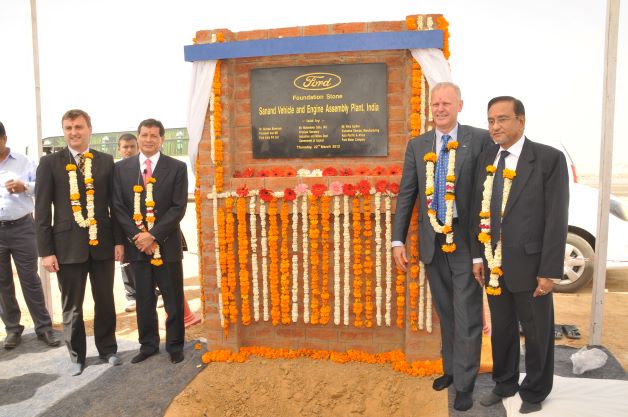
Ford is to end car manufacturing operations in India but plans to “significantly expand” its Chennai-based business solutions workforce and launch global vehicle models and electrified SUVs sourced elsewhere.
It has promised Indian customers will receive ongoing parts, service, and warranty support.

Discover B2B Marketing That Performs
Combine business intelligence and editorial excellence to reach engaged professionals across 36 leading media platforms.
See also: Reasons behind Ford’s change of strategy in India
Vehicle assembly in Sanand will end by the fourth quarter of 2021 and vehicle and engine manufacturing in Chennai by the second quarter of 2022.
The decision followed an accumulated operating loss of over US$2bn over the past 10 years and a $0.8 billion non-operating write-down of assets in 2019.
“The restructuring is expected to create a sustainably profitable business in India,” the automaker said in a statement.
Ford Business Solutions expansion will provide more opportunities for software developers, data scientists, R&D engineers, and finance and accounting professionals.
Some engine making also gets a reprieve.
Around 500 employees at the Sanand Engine plant, which produces motors for export for the Ranger pickup truck, and about 100 employees supporting parts distribution and customer service, also will remain on the payroll.
Ford will begin importing and selling vehicles such as the Mustang coupe and various planned electric models.
Sales of current products such as Figo, Aspire, Freestyle, EcoSport and Endeavour will end once existing dealer stocks are sold.
“As part of our Ford+ plan, we are taking difficult but necessary actions to deliver a sustainably profitable business longer-term and allocate our capital to grow and create value in the right areas,” said Jim Farley, FMC president and CEO.
“Despite investing significantly in India, Ford has accumulated more than $2bn of operating losses over the past 10 years and demand for new vehicles has been much weaker than forecast.
“I want to be clear that Ford will continue taking care of our valued customers in India, working closely with dealers, all of whom have supported the company for a long time. India remains strategically important for us and, thanks to our growing business solutions team, will continue to be a large and important employee base for Ford globally.”
Anurag Mehrotra, president and managing director of Ford India, added: “We are committed to taking care of our customers and working closely with employees, unions, dealers and suppliers to care for those affected by the restructuring.”
Ford India said it took these restructuring actions after investigating several options, including partnerships, platform sharing, contract manufacturing with other OEMs, and the possibility of selling its manufacturing plants, which is still under consideration.
“Despite these efforts, we have not been able to find a sustainable path forward to long-term profitability that includes in-country vehicle manufacturing,” Mehrotra said.
“The decision was reinforced by years of accumulated losses, persistent industry overcapacity and lack of expected growth in India’s car market.”
Around 4,000 employees are expected to be affected (axed) by the restructuring. Ford said it would work closely with employees, unions, suppliers, dealers, government, and other stakeholders in Chennai and Sanand to develop “a fair and balanced plan to mitigate the effects of the decision”.
It will maintain parts depots in Delhi, Chennai, Mumbai, Sanand and Kolkata and will work closely with its dealer network to restructure and help facilitate their transition from sales and service to parts and service support.
A smaller network of suppliers will support engine manufacturing for exports.
Ford also will continue to rely on India-based suppliers for parts for its global products, and suppliers and vendors supporting business solutions will continue as normal.
Ford expects to book pre-tax special item charges of about $2bn, including about $0.6bn in 2021, about $1.2bn in 2022 and the balance in subsequent years.
Within that total will be about $0.3bn of non-cash charges, including accelerated depreciation and amortisation. The remaining cash charges of about $1.7bn will be paid primarily in 2022 and are attributable to settlements and other payments.






